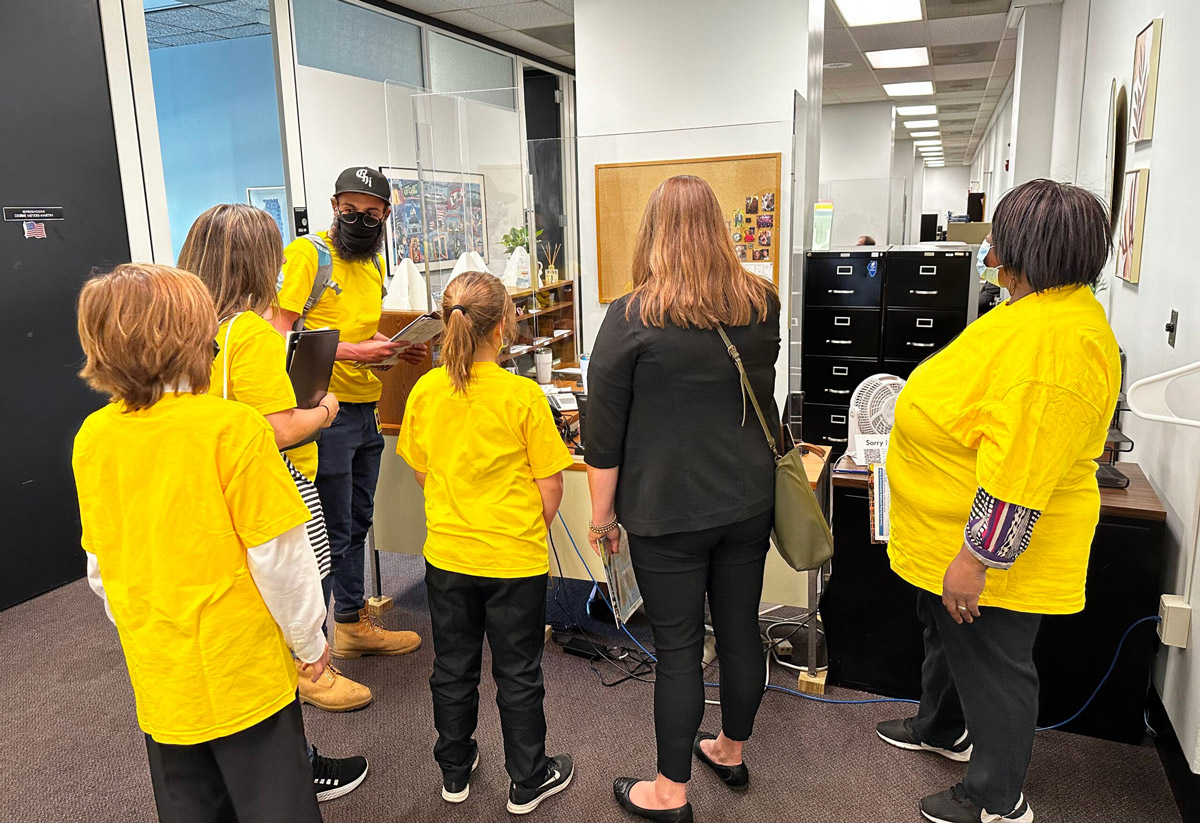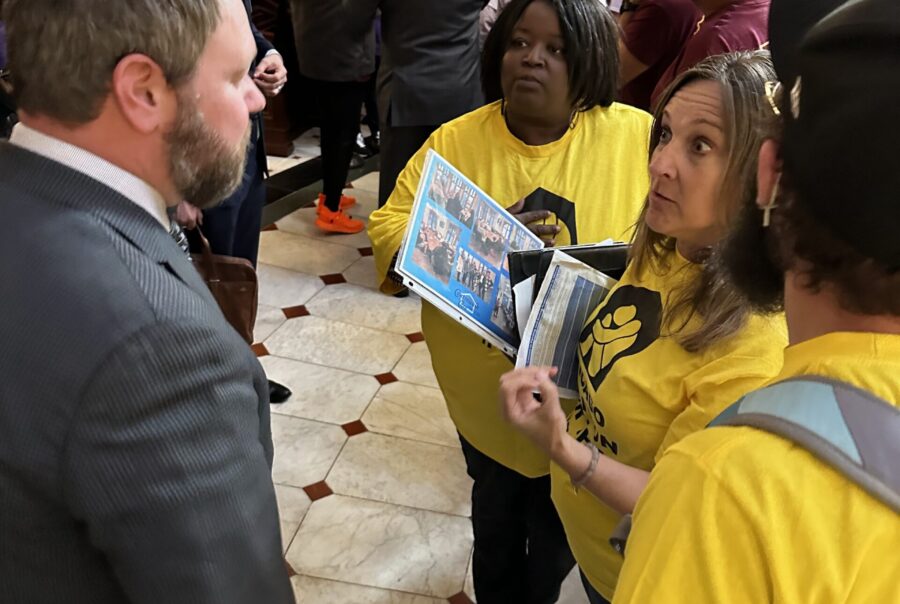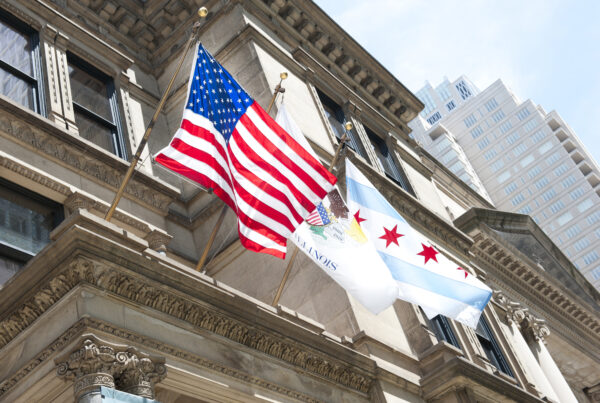

This spring Chicago Coalition for the Homeless (CCH) advocated for several statewide measures in Springfield that would help remove barriers for people experiencing and at risk of homelessness. CCH Policy, Law Project, and Organizing staff, along with our grassroots leaders, worked to pass legislation that will impact students experiencing homelessness, families attempting to retain their housing, extremely low-income families, and children, and provide additional funding to homeless and housing service providers.
During this session, CCH hosted several Lobby Days. Organizers brought a number of groups including high school students and teachers, the Homeless Prevention Coalition, grassroots leaders, and youth advocates. They had an opportunity to lobby on both CCH’s substantive legislation alongside budget advocacy.
Legislation Passed and Sent to the Governor for Signature
Strengthening Supports for Homeless Students
HB 5407 (Rep. Michelle Mussman and Sen. Adriane Johnson)
-
- Illinois has not funded homeless education in over fifteen years. Though the number of students identified as homeless has grown since that time. In recent years, the number of students experiencing homelessness in Illinois increased by 30.86% between the 2020-21 school year and the 2021-22 school year. The federal government has stepped in due to COVID-19 providing homeless education funding, but that support will end in September 2024. In reinstating funds for homeless education, CCH is asking the General Assembly to expand uses for homeless education funds alongside looking at novel ways in which to identify students experiencing homelessness as there are possibly up to 55,000 students experiencing homelessness who were not identified by school districts in Illinois.
Homelessness Prevention Program Improvements
HB 5564 (Rep. Lilian Jimenez and Sen. Laura Fine) included in HB 4959
The Homelessness Prevention Program is a 20-year-old program that has successfully ensured people maintain their housing. 88% of the people who utilize the program remain housed after receiving assistance. It saves the state thousands of dollars per individual in emergency services and shelter funding. Though funding for HPP services has grown, with additional funding additional assistance is needed to support the families and individuals contacting for assistance. With this legislation, providers will be permitted to use up to 20% of their funding for case management to ensure those who are assisted by the program remain housed after receiving assistance.
Ending Housing Retaliatory Behavior
HB 4768 (Rep. Will Guzzardi and Sen. Karina Villa)
Tenants living in buildings without access to heat, water, or other serious conditions sometimes have the added burden of being afraid to contact their landlords or government entities to resolve the issues out of fear of retaliation from their landlords just for reporting the violations. Illinois’ current statute provides only that a landlord cannot retaliate against their tenant by evicting the tenant if they seek governmental intervention for serious issues but provides little recourse to tenants seeking relief or experiencing other forms of retaliation other than eviction. In amending the current statute, we broadened the scope of retaliatory actions and protected activities and provided remedies available to tenants facing retaliation, both monetarily as well as specific performance.
Continued Advocacy Next Session
Community Safety Through Stable Homes Act
SB 3680 (Sen. Karina Villa and Rep. La Shawn Ford)
-
- Municipalities throughout Illinois have enacted so-called “crime-free housing and nuisance property” ordinances (CFNOs) under the guise of fighting crime and keeping communities safer. However, in practice, CFNOs establish a system that forces housing providers to unfairly penalize and sometimes evict tenants based on any alleged criminal or nuisance activity, pushing families into instability and even homelessness, which undermines public safety.
- CFNOs frequently exclude people of color from housing and endanger our community’s most vulnerable members. This includes survivors of domestic violence and people with disabilities, whose calls for emergency services or the police can lead to eviction rather than the assistance needed. These ordinances often violate fair housing and other civil rights laws.
- Making the Safe Communities and Stable Homes Act law will help make sure people aren’t afraid to contact the police, protect people from unfair discrimination, keep families in their homes, and refocus public policy on more effective responses to crime.
Illinoisians Dedicated to Offering Transitional Solutions
HB 4769 (Rep. Guzzardi)
-
- In Illinois, as with much of the country, people experiencing homelessness do not always have access to temporary shelter. For those individuals, finding refuge under viaducts and expressways may be the only way to find shelter from the elements. Understanding that these spaces also need repair or other construction projects, making sure that people using the space for shelter are notified and assisted with finding other options is also important. This legislation would require transportation departments to assess whether people experiencing are in the pathway of construction and if so partner with state or local human service departments to identify shelter or other housing opportunities.
Support the Community Partner Fair Contracting Act
HB 5064 (Rep. Avelar) SB 3457 (Sen. Halpin)
The Community Partner Fair Contracting Act (CPFCA) will rectify structural inequities in the state’s contracting, payment, and court of claims systems to ensure that health and human service providers can better meet the needs of their communities.
-
- Ensure Timely Contracts and Payments: Amends the Prompt Payment Act (PPA) to require agencies to issue contracts within 30 days of the start of the grant term and approve bills or invoices within 30 days. It also shortens the time frame between when the bill is approved and when interest begins accruing from 90 to 45 days.
- Expand and Clarify Advanced Payment Eligibility: Amends the PPA to expand the list of critical services in statute and requires state contracts to identify a payment date and whether a contract is eligible for PPA and advanced payment.
- Promote Flexible Contracts that cover the full cost of services: Amends the Grant Accountability and Transparency Act (GATA) to remove arbitrary caps on fringe benefits and prevents state agencies from limiting indirect costs in contracts or grant agreements to less than 20%.
- Expedite and Simplify Court of Claims Process: Amends the Court of Claims Act (CCA) to divert undisputed lapsed appropriation claims of less than $2500 and allow state agencies to pay claims from any appropriated funding source.
Fiscal Year 2025 Budget Advocacy
Commit to Funding and Ending Homelessness in Illinois
The recently completed state plan required by Governor Pritzker’s executive order, Home Illinois, creates a framework for achieving functional zero homelessness. The shortage of affordable housing is compounded by circumstances such as people losing employment, dealing with chronic physical and/or mental health problems, domestic violence, or a family turning away a child results in homelessness.
State-funded programs to prevent and end homelessness receive deeply inadequate funding to achieve the plan’s goals. Providers have continuously stepped up to serve more people in crisis during the pandemic and continue to struggle with:
-
- Increasing rents in the private market, making it harder to help people maintain or find a home.
- Agencies unable to pay competitive wages to retain and recruit qualified staff.
- Shelters losing donated spaces and volunteers due to COVID-19 concerns.
This legislation will increase the housing and homeless service line items. These funds will help support the development of new housing opportunities, keep people on the brink of homelessness to maintain their housing, provide supportive services, and make sure that staff in these programs are provided with a living wage.
Supportive Housing Services
-
- Total Increased Funding Need: $11 million
- The FY25 budget does not provide for additional funding.
Homeless Youth Program
-
- Total Increased Funding Need: $8 million
- The FY25 budget provides a $1.5 million increase through the reallocation of existing HOME Illinois funding
Homelessness Prevention Program
-
- Increased Funding Need: $10 million
- The FY25 budget provides a $5.4 million increase through reallocation of existing HOME Illinois funding.
Emergency and Transitional Housing Program
-
- Increased Funding Need: $20 million
- The FY25 budget does not provide for additional funding.
Homeless Education
-
- Increased Funding Need: $5 million
- The FY25 budget includes $16 million in ARPA dollars
Revenue Advocacy
In ensuring that the state has the funding to pay for these important services the House and Senate passed a Revenue package that includes increasing taxes on online sports betting, video gaming, hotel re-renters’ tax (on sites like hotel.com or kayak.com), and capping the retailers’ discount, and net operating loss deduction (placing limits on deductions corporations can take on their state taxes). This additional revenue will bring in just under a billion dollars.






 Chicago Coalition for the Homeless is now Chicago Coalition to end Homelessness (CCH).
Chicago Coalition for the Homeless is now Chicago Coalition to end Homelessness (CCH).